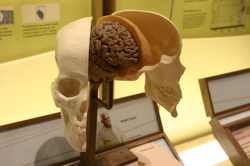
In a study published in Neurology, April, 2011, scientists found that older people who exhibited brain shrinkage were more likely to develop Alzheimer's disease than those whose brains weren’t shrinking. Another study in the same journal showed that vascular disease (risk factors: hypertension, diabetes, cardiovascular disease, high cholesterol) increased risk of developing Alzheimer's disease, probably because of the brain damage caused by vascular disease.
Fast forward to the October 23 (2012) issue of Neurology and read about whether doing puzzles is better than exercise for delaying brain shrinkage.
http://www.neurology.org/content/79/17/1802.abstract?sid=e573c7aa-3451-4154-a21b-2a0558023ae4
The author, a Scottish scientist, analyzed the brain structure of 638 people who have been followed since 1947 when, as 11-year-olds, they were given intelligence and mental health tests. Again, at about the age of 70, they were given intelligence tests and they were surveyed regarding their leisurely activities. At 73, they had MRI scans of their brains. The results were astounding.
The researchers found that those who exercised regularly (several times each week) had brains that had less shrinkage and less brain damage than those who did not exercise. Those who exercised mentally (crossword puzzles, reading, etc.) but did not exercise were more likely to have brain shrinkage. The scientists are now recording brain MRIs of the 638 participants who have now turned 76. They will compare the two MRI scans to see if the link between exercise and brain health is still valid.
Several years ago I read an article that inferred that rebound exercise (jogging, running, trampoline) increased neuronal growth in the brain. That article (which I can’t find) helped motivate me to keep running. And, even though I’m no scientist, I have observed the mental capacity of many runners in their 70s.
The most dramatic example I’ve seen is Mike Fremont who, at 90, will attempt to set a new American age record in the marathon at the Marshall University marathon on November 11 in Huntington, West Virginia. When I have the chance to walk with Mike, I marvel at his mental sharpness and his passion for life. He spits out facts and figures faster than a computer and does it with ease and without smugness or sarcasm, two traits I see in a lot of older people.
Mike embodies valuable LifeNut traits: physical fitness, a sensible plant-based nutrition, strong relationships, a positive attitude, volunteerism, good stress management, an intense life purpose, and a sense of balance. He’s a reader, too, continually stimulating his intellect – even though this recent study shows that physical exercise contributes more than mental exercise to continued mental acuity in the golden years.
LifeNuts exercise aerobically (cycling, swimming, running, spinning, etc.) for at least six intense hours each week. They have a BMI in the low 20s or high teens. They have robust lung and heart function. Chances are they will be in the 50% of the population over 85 that doesn’t have dementia. Which group do you want to be in?



 RSS Feed
RSS Feed